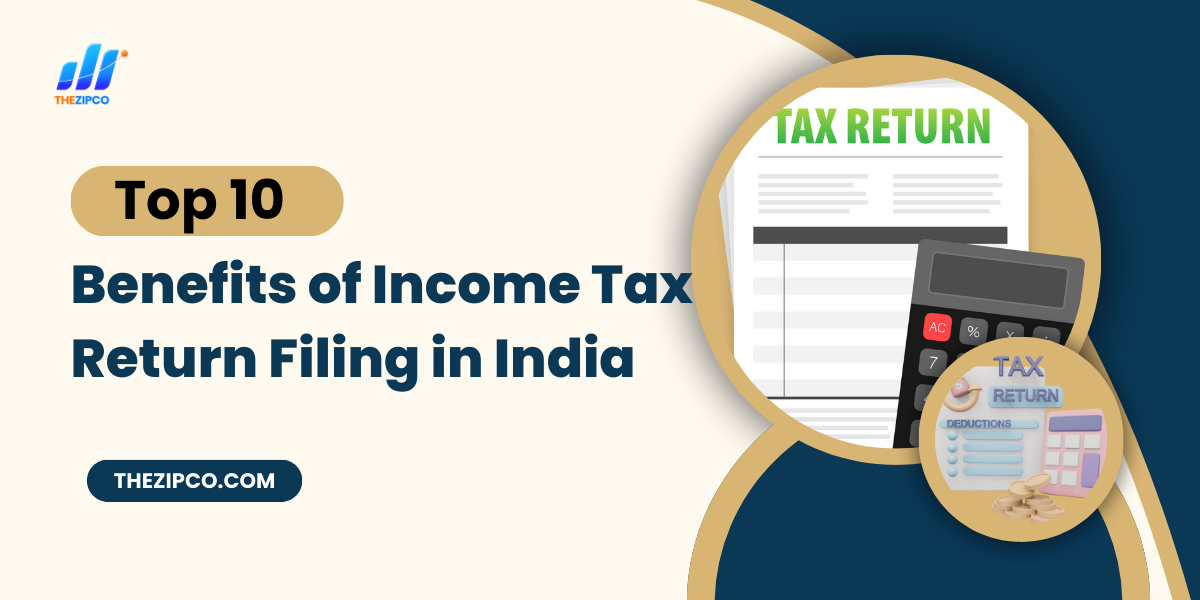An Income Tax Return (ITR) is a form that individuals and entities complete to report their income, calculate the tax owed, and detail any applicable exemptions and deductions for a particular financial year. The primary reason for filing an ITR is to claim tax deductions, although there are several other motivations for doing so.
In this blog, we provide a comprehensive guide to Income Tax Returns (ITRs) and their importance, aiming to highlight the benefits of filing an ITR and address common questions taxpayers may have. We will cover all aspects of ITR advantages, including who is required to file and the consequences of not filing. Let’s dive in!
Meaning of Income Tax Return
An Income Tax Return (ITR) is a form used to report your income and tax information to the tax authorities. The tax owed is calculated based on the income you have earned.
If the return shows that excess tax was paid during the year, the individual will be eligible for an income tax refund from the Income Tax Department. By law, any individual or business earning income during a financial year must file a return annually.
Income can be derived from various sources, such as salary, business profits, rental income from real estate, dividends, capital gains, interest payments, or other sources. Individuals or businesses must file their tax returns by a specified deadline. If a taxpayer misses this deadline, they are obligated to pay a penalty.
Who is Eligible to File Income Tax Return?
The Income Tax Act specifies that only individuals or businesses within certain income brackets are required to pay income tax. Below is a list of entities and businesses that are obligated to fully comply by filing their ITRs in India:
- Individuals under the age of 59 with an annual income exceeding ₹2.5 lakh are subject to this tax. For senior citizens (aged 60 to 79), the threshold increases to ₹3 lakh, and for super senior citizens (aged 80 and above), it rises to ₹5 lakh. It’s important to note that these income amounts should be calculated before considering deductions under Sections 80C to 80U and other exemptions under Section 10.
- Additionally, registered businesses generating revenue must file an ITR, regardless of whether they have made a profit during the year. This requirement also applies to those seeking a refund for any excess taxes deducted from their income taxes.
- Furthermore, registered businesses generating revenue are required to file an ITR, even if they did not make a profit during the year. This obligation also extends to those requesting a refund for any overpaid taxes deducted from their income.
Top 10 Benefits of Filing Income Tax Return in India
1) Excess TDS Claim
Tax can be deducted from your salary, fixed deposits, or any other source, even if your overall income is not taxable. For example, if your total income is below ₹2.5 lakh but you earned ₹1 lakh from a bank fixed deposit, the bank must deduct 10% tax from this amount.
In such cases, you can reclaim the deducted tax by filing an ITR. Simply put, to recover any TDS deducted at the source, an individual must file a tax return.
2) VISA Application
Including ITR documentation with a visa application can reduce the likelihood of rejection or scrutiny. The tax return serves as evidence of an individual’s civic responsibility.
Due to increasing security concerns, many countries now require ITR for visa applications. For example, even if you had no income in the past three years, you must still submit the returns from those years when applying for a Schengen Visa.
3) Establishing Losses
To carry forward a loss from the previous year’s stock market, filing a return is necessary, even if it shows zero income.
Filing an ITR is essential to offset capital losses, regardless of whether there’s any profit. Moreover, individuals with foreign stocks must comply with income tax regulations by filing an ITR.
4) A Reliable Proof of Address
An Income Tax Return serves as valid address verification and can even be used to obtain an Aadhaar Card. Address proofs such as Aadhaar Cards, licenses, passports, and similar documents are often required. In cases where common forms of identification like ID cards are not accepted, your Income Tax Return can be utilized.
5) Authentic Evidence of Your Earnings
Employers typically provide Form 16 to employees as evidence of income. For self-employed individuals or independent contractors, the ITR Filing form serves as the actual income verification document. It provides a comprehensive breakdown of income and expenses for the entire fiscal year.
6) For Purchasing High Coverage Insurance
There’s a growing trend of people buying life insurance policies exceeding ₹50 Lakhs. However, insurance companies require your ITR records displaying your annual income to accept such policies. Your earned income determines the coverage you qualify for, and presenting your ITR assures the insurance company of your substantial earnings.
7) A Crucial Document for Loan Application
When applying for a loan to purchase items such as a car or a new home for your family or business, banks typically request various documents from you. These may include Aadhaar Cards, PAN Cards, licenses, photo identification, and more.
Additionally, your proof of income is a crucial document requested by banks. Frequently, banks ask for ITR for the previous three years. This is to assess your ability to repay the loan based on your financial history and current circumstances.
ITR is not only beneficial for loan applications but also for applying for a credit card. Credit card companies often require your previous earnings and tax returns before issuing a credit card to you.
8) Scholarship Advantages
ITR is recognized by various authorities as a credible source of income documentation, both in government and private sectors.
For example, you can utilize an ITR to apply for certain scholarships offered by institutes and universities. It helps demonstrate the prospective student’s financial capability. Insurance companies also acknowledge ITR as valid documentation.
9) Funding for Startup Ventures
When preparing to start a new business or expand an existing one, you may seek funding from external sources such as venture capitalists or seed investors.
These investors may request details from your ITR to assess the financial stability and profitability of your business. They might also use your ITR forms to corroborate the data in the audited report.
10) Benefits for Independent Contractors & Professionals
Self-employed individuals or independent contractors do not receive Form 16. Often, their ITR is the sole document proving their income tax filing. Without this evidence, they may encounter difficulties securing funding and facing transactional hurdles.
Importance of Filing Income Tax Returns
There seems to be a misconception among many that filing tax returns is discretionary, leading them to dismiss it as unnecessary and burdensome. However, this perspective is not constructive.
Filing tax returns annually is considered a moral and social responsibility of every conscientious citizen of the nation. It provides the government with the necessary data to calculate citizen expenditures and ensures fairness in the tax system. Additionally, it offers taxpayers a platform to request refunds and seek other forms of relief when applicable.
Conclusion
As you’ve likely gathered by now, there’s no justification for avoiding the annual ITR filing process. Ensure you pay your taxes promptly and submit your returns. The benefits are truly what make the difference.
Please note: This blog is exclusively for educational purposes.
Keep reading and supporting Thezipco!


